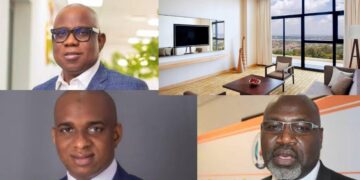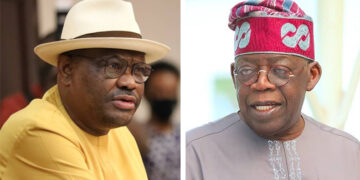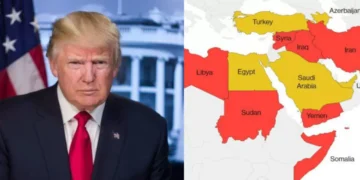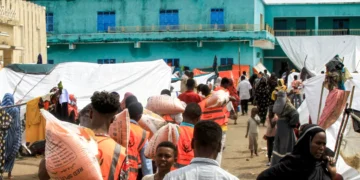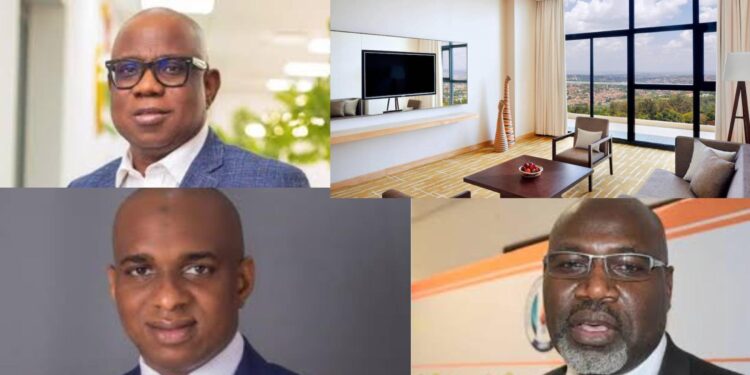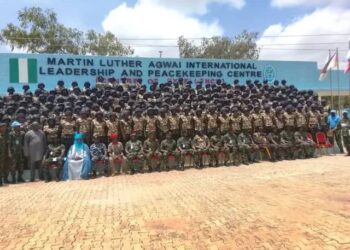In a stunning show of opulence and disregard for public accountability, the Board of the Nigerian National Petroleum Company Limited (NNPC Ltd.) is preparing to jet off to Kigali, Rwanda, this Friday for a luxury retreat.
This comes just days after the Nigerian Senate raised serious questions over the company’s audited financial accounts.
It was gathered that at least five private jets have been arranged to fly members of the NNPC board and top management to the Rwandan capital. The trip, sources revealed, is being coordinated by Abdullahi Bashir-Haske, the founder of AA & R Investment Group and son-in-law to former Vice President Atiku Abubakar.
The board, led by Chairman Ahmadu Musa Kida, and under the management of Group Chief Executive Officer (GCEO) Bayo Ojulari, is expected to converge at the Kigali Marriott Hotel, an upscale resort nestled in the Rwandan hills.
According to reports, the entire hotel has been booked out by NNPC ahead of the retreat.
Senate Questions, NNPC Board Goes On Retreat
The timing of the retreat has raised eyebrows. Only days ago, Nigeria’s Senate demanded answers from NNPC over discrepancies and troubling irregularities found in the company’s latest audited financial records. Yet rather than respond publicly, NNPC leadership has opted for a high-end “board retreat” far away from public scrutiny.
“Instead of addressing serious allegations brought forth by the Nigerian Senate regarding its audited accounts, the NNPC board and its leadership are preparing to travel to Kigali, Rwanda, on Friday on five private jets arranged by the son-in-law of Vice President Atiku Abubakar,” a top source privy to the trip said.
“Their goal is to conduct a board retreat at an exclusive resort in the Kigali hills. Led by Musa Kida, the board seems to be unaware of the distress caused to Nigeria by NNPC’s poor performance over the years. Rather than concentrating on improving NNPC, this so-called board of experts appears more focused on enjoying their own privileges.”
This comes at a time when the country is grappling with record-breaking debt levels and revenue shortfalls, the bulk of which have been linked to NNPC’s opaque operations over the years.
Private Jets, Public Funds
Multiple sources confirm that four of the five jets set to convey the NNPC entourage to Rwanda are being provided by Bashir-Haske, a businessman with long-standing ties to Nigeria’s political elite and energy sector deals.
Bashir-Haske’s company, AA & R Investment Group, has previously been linked to oil bloc allocations. When contacted by SaharaReporters, Bashir-Haske did not respond to calls or provide any comment as of the time this report was filed.
However, he later sent a third party to contact our correspondent, claiming that Bashir-Haske is not associated with private jets and was not engaged by NNPC Ltd. The intermediary also appealed to SaharaReporters not to publish the report. When asked if Bashir-Haske could speak directly to our correspondent, the caller stated that he was not willing to engage with SaharaReporters.
At the heart of the NNPC board’s Kigali getaway is the Kigali Marriott Hotel, where the delegation is expected to stay for the duration of the retreat. The luxury hotel, one of the finest in East Africa, features a spa, multiple gourmet restaurants, and panoramic views of the Rwandan highlands.
Room rates at the hotel range from $173 for a standard suite to as much as $3,794 per night for luxury accommodations. The average room rate is put at $320. With about a dozen NNPC board members, aides, and other personnel expected to attend, the cost of the full retreat—accommodation, air travel, logistics, and allowances—could run into hundreds of thousands of dollars.
“This is a government-owned enterprise that can’t explain discrepancies in its audited account, yet they are flying in private jets to a resort abroad,” a source said.
Critics have long accused NNPC of being bloated, corrupt, and ineffective, despite its central role in Nigeria’s economy. Rather than chart a course toward transparency, energy security, and fiscal responsibility, the current leadership appears more interested in personal comfort and high society networking, observers say.
“There’s nothing strategic about this trip,” said an oil industry insider who spoke on condition of anonymity. “If they wanted to discuss policy, reform, or performance metrics, they could have done it in Abuja, or even via secure virtual conferencing. But they chose Kigali—because this is about luxury, not reform.”
Attempts to reach NNPC’s Chief Corporate Communications Officer, Femi Soneye, were unsuccessful, as he neither answered phone calls nor responded to a text message sent to him.
As Nigerians continue to suffer under the weight of inflation, dwindling power supply, and surging petrol prices, the revelation of this elite escape by NNPC leadership will likely deepen public anger.
Senate Probe
Meanwhile, just this Wednesday, the Nigerian Senate issued a one-week ultimatum to the NNPC Ltd. to account for financial discrepancies amounting to over ₦210 trillion in its audited statements covering the years 2017 to 2023.
The directive was handed down during a session of the Senate Committee on Public Accounts, where NNPCL’s Chief Financial Officer, Dapo Segun, appeared alongside other senior executives to answer queries.
Lawmakers reacted with shock, describing the discrepancies, particularly in the areas of accrued expenses and receivables, as “mind-boggling” and deeply troubling.
Committee Chairman Senator Aliyu Wadada condemned the irregularities as “unacceptable,” vowing that the Senate would invoke the full weight of its oversight authority to ensure accountability.
The panel said, “Legal fees were accrued without any explanation or documentation regarding the legal services rendered. The auditors’ fees raise similar questions. There are no clear justifications. Everything we’ve seen and heard from the audited financial statements is troubling.”
“Trillions of naira are in question, and the new document they presented this afternoon doesn’t match what’s already in their audited report. It’s completely independent and contradictory,” Wadada said.
“We are looking at over ₦210 trillion in just two categories—accrued expenses and receivables. These are not mere rounding errors; they raise fundamental questions about transparency and financial integrity.”
The Senate raised serious concerns over the audited reports, which revealed ₦103 trillion in accrued expenses. This included ₦600 billion marked as retention fees, along with vague legal fees and auditor charges—none of which were supported by documentation or contractual references.
Further raising suspicions, the committee pointed to another ₦103 trillion listed under receivables. Just before the hearing, NNPCL submitted a revised document that directly contradicted figures in the publicly released audit, prompting criticism over the reliability and transparency of the financial disclosures.
The senator voiced concern that NNPCL proceeded to release and approve the audited financial statements despite ongoing internal reconciliation processes.
He cautioned that such premature actions could damage Nigeria’s credibility in the global financial arena, particularly as the company prepares for its anticipated Initial Public Offering (IPO).
“How do you proceed to finalise audited accounts while still reconciling such massive figures?” he asked.
The committee has submitted a set of 11 critical questions to NNPCL and expects detailed responses within one week. Lawmakers stressed that this is not a witch-hunt, but a necessary step to uphold fiscal discipline amid the government’s broader push for revenue generation.
In a revelation that heightened concerns, the Senate uncovered that between 2017 and 2021, the National Petroleum Investment Management Services (NAPIMS)—a major subsidiary of NNPCL—declared profits totalling ₦9 trillion, even as the parent company, NNPCL, recorded a loss of ₦16 billion over the same period.
“How can a subsidiary report trillions in profit while the parent company bleeds losses?” Wadada asked. “That math doesn’t add up.”
Sahara Reporters.


